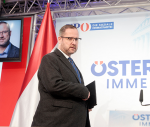You are here
Not much ground
Oct 14,2017 - Last updated at Oct 14,2017
Catalan President Carles Puigdemont promised his people to declare independence for Catalonia last Tuesday, but faced with much internal and external pressures, he finally took a middle course: proclaimed independence before his regional parliament but stopped short of calling on the legislature to act on it and officially declare the independence of his region. Puigdemont said that his decision to put on hold officially declaring the independence of Catalonia was pending the outcome of further talks with Madrid.
Obviously he wanted to keep the door open and reach a reconciliation between “theory” and “practice”.
The independence movement in Catalonia faced stiff opposition right from the start not only from Madrid but also from the constitutional court of the land, which proclaimed that last week’s referendum was unconstitutional and therefore null and void.
There has been no external support for the separation of Catalonia from Spain, not from the EU nations and not from the UN, whose secretary general openly spoke against it, calling it unlawful and politically not viable.
Spain’s pressure on Catalonia went as far as threats by Madrid to intervene militarily to arrest its leadership if a declaration of independence is indeed declared.
Although about 90 per cent of those who took part in the referendum last week voted in favour of separation, only 43 per cent of the people of Catalonia actually participated in the referendum.
This fact alone has undermined the political push to separate on the basis of the exercise of the right to self-determination
It also means that Puigdemont has really no mandate to secede.
The separation movement can be expected to fizzle out in the upcoming weeks in favour of a new arrangement between Madrid and Barcelona.












